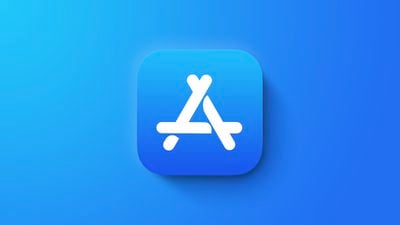Apple is planning to allow for alternate app stores on iPhones and iPads ahead of European legislation that will require the company to support sideloading, reports Bloomberg.

The change would allow customers to download apps without needing to use the App Store, which would mean developers would not need to pay Apple's 15 to 30 percent fees, but to start with, Apple is only planning to implement sideloading support in Europe.
If other countries introduce similar legislation, alternate app stores could expand beyond the European Union. The United States, for example, is considering legislation that would require Apple to allow sideloading. Apple has claimed that sideloading will "undermine the privacy and security protections" that iPhone users rely on, leaving people vulnerable to malware, scams, data tracking, and other issues.
The European Union's Digital Markets Act that went into effect on November 1 requires "gatekeeper" companies to open up their services and platforms to other companies and developers. The DMA will have a major impact on Apple's platforms, and it could result in Apple making major changes to the App Store, Messages, FaceTime, Siri, and more. Apple has until March 6, 2024 to comply with the EU's rules.
According to Bloomberg, Apple's software engineering and services employees are working to open up "key elements of Apple's platforms," with Apple using a "significant amount of resources" for the change. Apple is planning for the functionality to be ready for iOS 17 in 2023, which would put it ahead of the deadline. There is a danger that these drastic updates could impact work on new features slated for iOS 17, some employees told Bloomberg.
To protect users from the aforementioned risks of sideloading, Apple is considering implementing security requirements such as verification, a process that it could charge a fee for in lieu of collecting money from app sales. Apple has a verification system on Mac that allows users to be safe while giving them access to apps outside of the Mac App Store.
Apple could open up underlying app frameworks and APIs to third-party app developers, providing deeper access to core system functions and hardware. Third-party apps could in the future get access to camera technologies not available now, and Apple is working to open up NFC in a limited way that could allow for Apple Pay alternatives. Apple is also considering further opening up the Find My network to accessory makers like Tile. As of now, Apple lets third-party device makers create Find My accessories, but there is a requirement that prevents them from working with non-Find My apps and services.
There is an aspect of the Digital Markets Act that would require Apple to allow developers to install third-party payment systems within their apps, and Apple has not yet "made a final decision" on whether it will comply with the rule. Apple is also undecided on how the Messages app might be made available to third-party services, as the DMA requires interoperability between messaging platforms.
Apple has to comply with the Digital Markets Act because the European Union can fine a company as much as 20 percent of its global revenue if the laws are violated. If Apple does not implement the changes, fines could be as high as $80 billion.
In addition to resulting in major changes to the App Store and other Apple services, European legislation is also pushing Apple to adopt USB-C across all of its devices, a change that will be made in 2023.





















